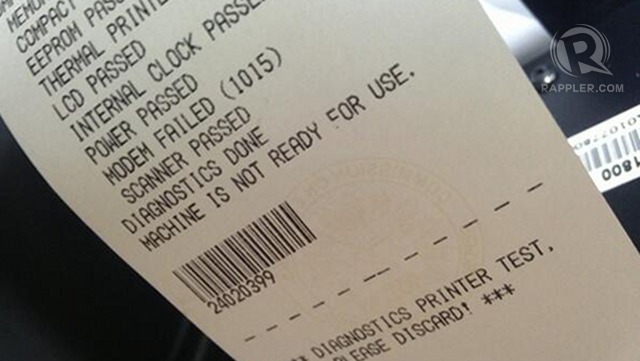SUMMARY
This is AI generated summarization, which may have errors. For context, always refer to the full article.

MANILA, Philippines – Compare, poll chief Sixto Brillantes Jr said.
This year, Brillantes noted, the Commission on Elections (Comelec) has found less than a hundred glitches in the ballot-counting machines that underwent the final testing and sealing (FTS) process.
He said in contrast, in 2010, the Comelec found errors in around 76,000 compact flash (CF) cards, the memory cards used in the precinct count optical scan (PCOS) machines.
In effect, he said the glitches in 2013 comprise less than 1% of those reported in 2010. “Percentage-wise, wala, halos wala, so kayang kaya naming i-solve within the next few days,” Brillantes told reporters. (Percentage-wise, there’s none, almost none, so we can definitely solve this in the next few days.)
Based on reports compiled by Rappler, initial problems include a PCOS machine that “is not ready for use,” another machine that shut down while printing, and a CF card that failed. Poll watchdogs blasted the Comelec over these glitches.
A final dry run, the FTS is meant to test the completeness, security, and accuracy of PCOS machines. While it was done in 60% of polling precincts on Monday, it is ongoing until Saturday, May 11. (Watch Rappler’s video report below.)
Brillantes described the FTS as generally a success. Brillantes blamed the media for supposedly exaggerated reports on PCOS glitches.
“Konting problema lang namin sa media is, hinahanapan nila ng maliliit na mali. Maliliit. Wala ‘yung malalaki. Our analysis so far is that we have small glitches, which affect not the count, not the count – so sa resulta walang problema,” Brillantes explained.
(Our problem with the media is, they look for the smallest mistakes. The smallest. But there’s none of the major ones. Our analysis so far is that we have small glitches, which affect not the count, not the count – so there’s no problem with the results.)
‘Self-proclaimed’ success
Poll watchdog Automated Election System (AES) Watch, however, said their initial reports reveal findings “contradicting the self-proclaimed ‘success’” trumpeted by Brillantes.
AES Watch listed problems including lack of election paraphernalia, delayed FTS, zero transmission signals, and PCOS and manual counts that don’t match.
“The claims of ‘success’ by Comelec should really be verified against reports by independent watchdogs and other witnesses,” AES Watch said.
The group Kontra Daya, for its part, belied the Comelec’s claims that the FTS will build confidence in the election process.
“Unfortunately, the results of the FTS merely reinforced the widespread public fear on the possible failure of PCOS machines and the entire AES to provide credible results,” it said.
The Comelec, as well as poll watchdogs, has yet to release a full report on Monday’s FTS.
Critics have cast doubt on the accuracy of PCOS machines, while the Comelec has tried to boost their credibility. On Monday, for instance, the Comelec revealed that it will open the source code of PCOS machines for a local review, for the first time. – Rappler.com
Add a comment
How does this make you feel?
There are no comments yet. Add your comment to start the conversation.